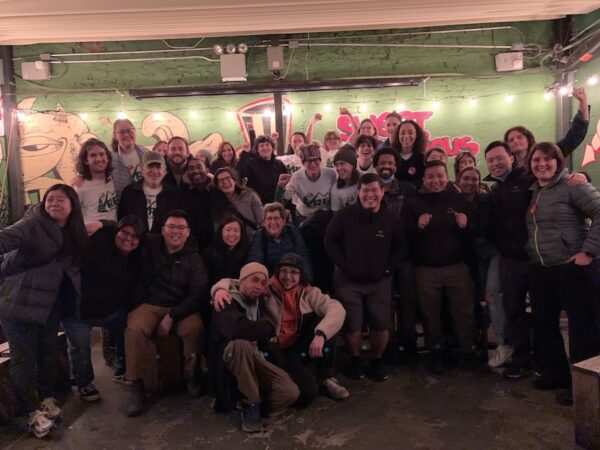
Ultimately, employees revolting against inadequate safety measures around Covid-19, callous scheduling policies and other anti-worker measures, voted 88 to 14 in favor of unionization. Contract talks with REI SoHo management are now expected to kickoff sometime over the next 12 weeks.
LaborPress spoke to Damien Sowell, an REI SoHo shipping and receiving specialist, and Graham Gale, a bike and ski technician at the store, to learn more about their wildly successful unionization drive and their thoughts about the future.
LP: How do you feel about your job now? Do you like it in general or do you feel that too many issues have overwhelmed any good feelings you might have had?
DS: The issues at the job didn’t necessarily sully my idea about the role that I have or the job being a place that I liked working at, but the issues are pretty prevalent and they’ve gotten progressively worse as I’ve been working so…
GG: [The biggest issues are] being overworked and underpaid. We have an incredibly diverse and knowledgeable group of people at REI, and that was a reality given pre-pandemic [conditions]. I think the pandemic sort of, like in a lot of other industries, brought to light the sort of exploitation that was occurring. But even before the pandemic, people were feeling like they were doing a lot of work and sharing a lot of information and kind of going above and beyond and not being properly compensated for it.
LP: What about COVID safety issues at the store? Did you feel REI took adequate measures to protect you and your co-workers from getting sick?
DS: I think CDC guidance has been a little bit murky at some points, but in general, for the things that they could handle and be in control of, such as a local mask mandate, making sure we’re using counters for capacity so that no particular place is overwhelmed – these things were brought up time and time again… and those things weren’t done time and time again. So, in regards to COVID response, I feel it was lacking for sure.
LP: Did you or any of your co-workers get sick?
DS: Yes, there were a number of us who have been out, myself as well at one point, due to COVID. There were a lot of people out sick. Yes.
LP: Did you, or do you, perceive a gap between REI’s behavior and its stated “progressive” values?
DS: Most definitely. The ideas of profit-sharing and benefits for both part-time and full-timers isn’t actualized to a degree that’s actually gonna help someone’s situation and employment there. It’s very difficult for folks to enjoy bonuses that CEOs get, as well as being able to have access to healthcare without a very lengthy time frame, which has led to a lot of turnover…[because of] not being able to share in profits and have sustainable healthcare. My idea of a co-op is one in which everyone contributes and everyone’s able to reap equally. That just hasn’t happened in my time there.
LP: What do you think about REI’s union busting efforts?
DS: It was pretty aggressive from the get-go. The idea that they are neutral was thrown out the door immediately because as soon as the delegation presented the document to the management [anti-union] flyers started going up. One-on-one meetings started happening. And they were being really persistent with spreading misinformation, in my opinion. Things that were counter to my experience with RWDSU, counter to my limited, but studied knowledge of unions. I felt like oh, this is just totally not like how the process is supposed to go. At every turn, they were seeking to misinform people who might not have been as diligent as myself or some of my cohorts. Even in our break room for example, it started off with a few flyers and then our entire break room was just littered with flyers and anti-union propaganda, not a surface was safe. Which was pretty invasive for an area where we were supposed to be able to take a break from work, take a break from things and kind of decompress for the day. We were still getting talked to by management. Very, very aggressive.
GG: It was awful. I mean, unionizing is stressful in its own right. You know, there’s the secrecy and trying to do everything and make sure that management doesn’t find out prematurely. But also making sure that everything is done to a tee, legal-wise. So, there was the stress of having all of those conversations and getting people involved. But then going public and just seeing the very blatant disconnect between REI’s values — that truly was the most astounding part of this. So yeah, the clear disconnect between their values and not supporting a unionization campaign, and also just like the aggression with which they went about union busting was horrible. It was very bad.
LP: What do you think of other workers attempting to organize in places like Starbucks and Amazon?
GG: I have been so inspired by all of the unionization efforts that have been going on. Actually, one of the most important ones for me was the Kickstarter unionization. They created a podcast series that just detailed how they actually organized and the types of conversations they were having and the strategies that they use. And that was essential for me and the rest of my organizing committee in our early stages. And every new Starbucks that organizes — I also know organizers from RWDSU that have been in Bessemer [Alabama] helping to organize Amazon —all those stories are just incredibly inspiring. I think organized labor is the future.
DS: In many ways, these [unionization] drives inspired us. It had me realize that we’re all in various stages of advocating for ourselves, as the city and state become progressively more and more about business, more and more about construction development and about profit. So, just seeing other groups stand up to Amazon, which is a behemoth, stand up to Starbucks which is everywhere, ingrained in every single neighborhood, it was really comforting. I didn’t feel alone. Also, you know, it was an inspiration, because these are people in my same situation, trying their best to stand up for themselves and their co-workers. I feel like I look to these drives, whether they’ve won their votes or not, for constant inspiration.
LP: What’s your reaction to the vote at your store?
DS: It’s really great to have allowed a democratic process and hopefully continue on that same path going forward. Just involving everyone and allowing everyone’s voices in here, because that’s the origin of this whole drive. It’s just us being able to speak up and advocate for ourselves.



